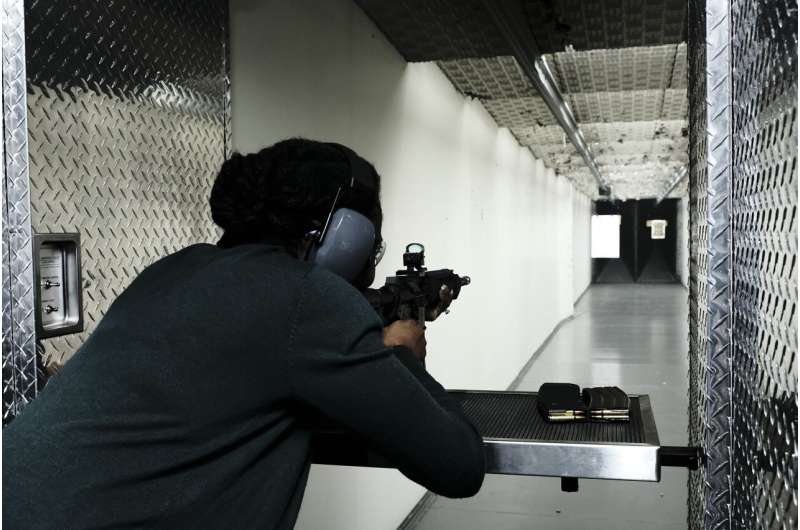
Virtual reality technology can do more than teach weaponry skills in law enforcement and military personnel, a new study suggests: It can accurately record shooting performance and reliably track individuals' progress over time.
In the study of 30 people with a range of experience levels in handling a rifle, researchers at The Ohio State University found that a ballistic simulator captured data on the shooters' accuracy, decision-making and reaction time—down to the millimeter in distance and millisecond in time—on a consistent basis.
In addition to confirming that the simulator—called the VirTra V-100—is a dependable research tool, the findings could lead to establishing the first-ever standardized performance scores for virtual reality ballistics training.
"To our knowledge, we're the first team to answer the question of whether the simulator could be converted to an assessment tool and if it's credible to use it day-to-day," said Alex Buga, first author of the study and a Ph.D. student in kinesiology at Ohio State.
"We've figured out how to export the data and interpret it. We've focused on the three big challenges of marksmanship, decision-making and reaction time to measure 21 relevant variables—allowing us to put a report in a user's hand and say, 'This is how accurate, precise, focused and fast you are.'"
The study was published in the Journal of Strength and Conditioning Research.
U.S. military leaders and law enforcement agencies have shown an interest in increasing the use of virtual reality for performance assessment, said Buga and senior study author Jeff Volek, professor of human sciences at Ohio State. Earlier this year, an Ohio Attorney General Task Force on the Future of Police Training in Ohio recommended incorporating virtual reality technology into training protocols.
Volek is the principal investigator on a project focused on improving the health of military service members, veterans and the American public. As part of that initiative, the research team is investigating the extent to which nutritional ketosis reduces detrimental effects of sleep loss on cognitive and physical performance in ROTC cadets—including their shooting ability as measured by the VirTra simulator. Verifying the simulator's results for research purposes triggered the attempt to extract and analyze its data.
"We were using it as an outcome variable for research, and we found that it has very good day-to-day reproducibility of performance, which is crucial for research," Volek said. "You want a sensitive and reproducible outcome in your test where there's not a lot of device or equipment variation."
Because the lab also focuses on human performance in first responders, researchers' conversations with military and law enforcement communities convinced Buga that data collected by the simulator could be more broadly useful.
More information: Alex Buga et al, The VirTra V-100 Is a Test-Retest Reliable Shooting Simulator for Measuring Accuracy/Precision, Decision-Making, and Reaction Time in Civilians, Police/SWAT, and Military Personnel, Journal of Strength & Conditioning Research (2024). DOI: 10.1519/JSC.0000000000004875
Citation: Virtual reality as a reliable shooting performance-tracking tool (2024, June 11) retrieved 11 June 2024 from https://techxplore.com/news/2024-06-virtual-reality-reliable-tracking-tool.html
This document is subject to copyright. Apart from any fair dealing for the purpose of private study or research, no part may be reproduced without the written permission. The content is provided for information purposes only.
